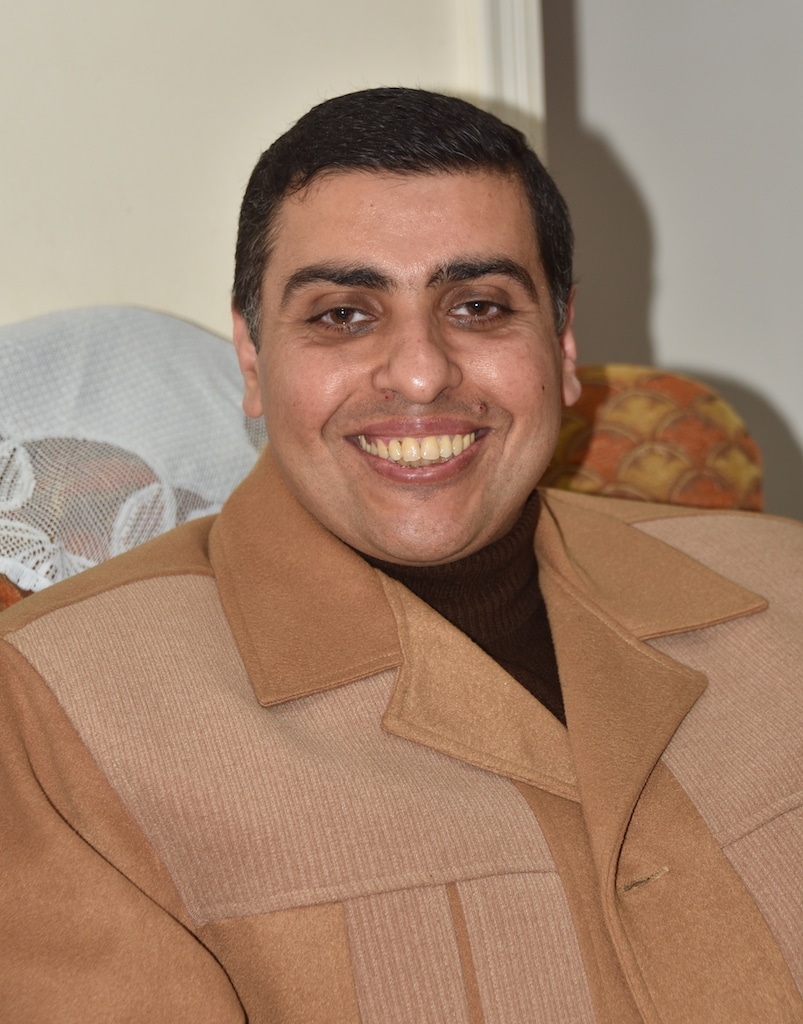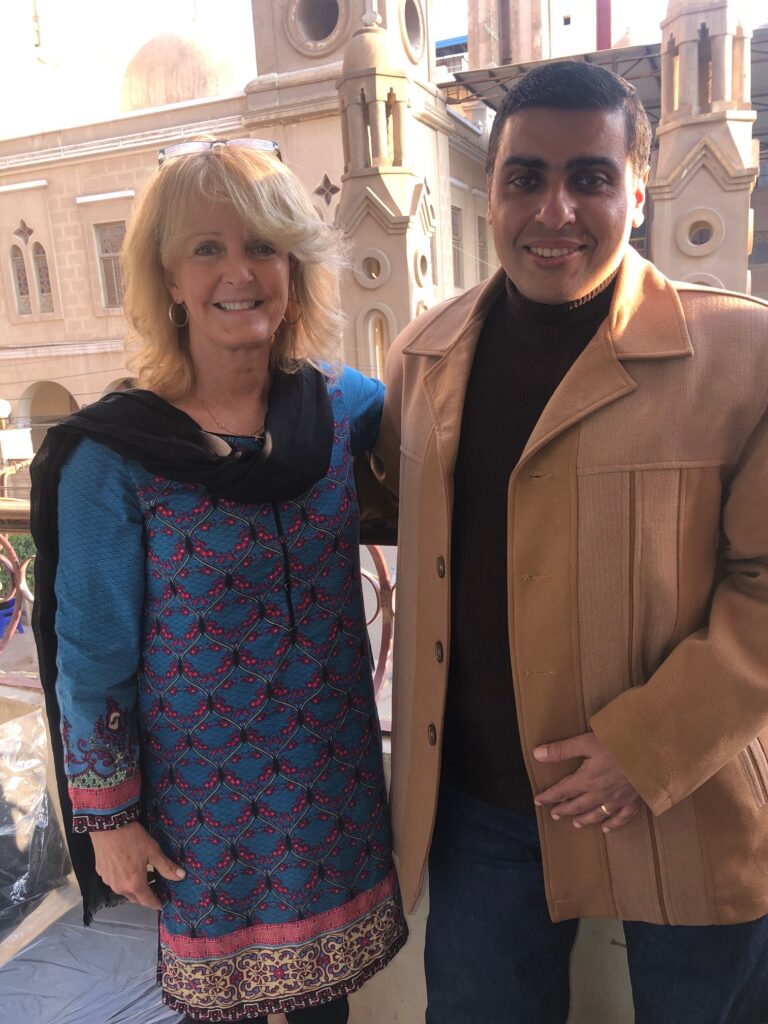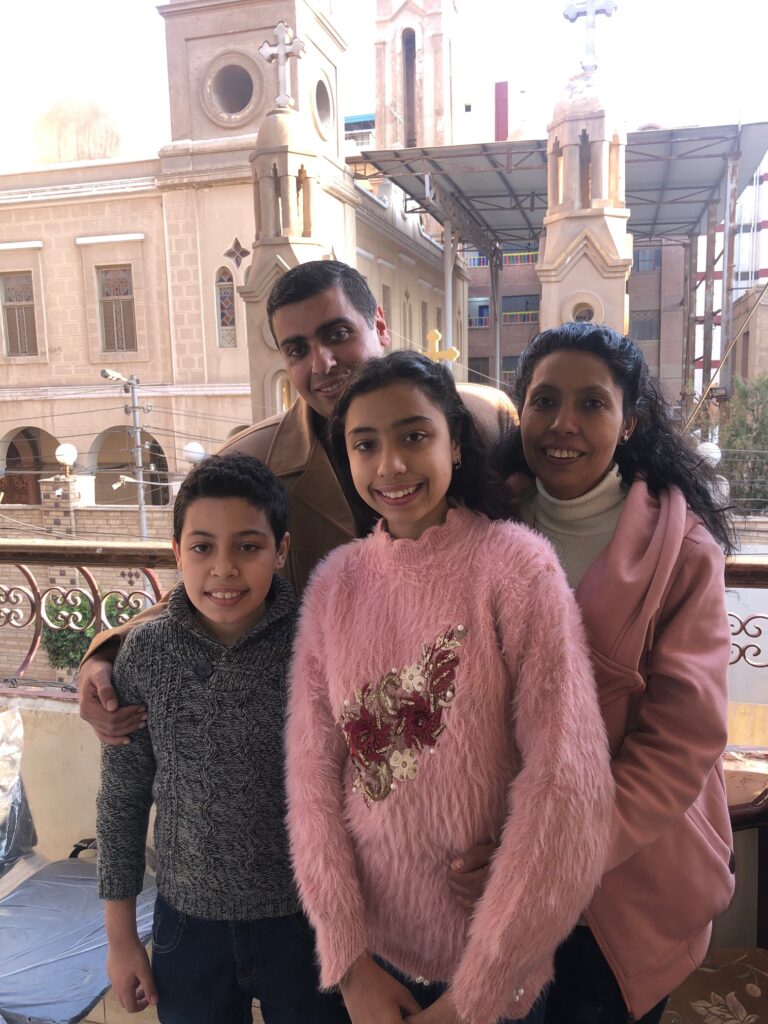Visit to Egypt: Sharing with the One

Tamer Hanna is blessed: intelligent, handsome, fluent in English, beautiful wife and two wonderful children. At age 45, he has a steady income and is self-sufficient. He also has a problem: he has hemophilia. And he lives in Egypt, which does not receive enough donated factor so that he can have some at home, or even when he bleeds.
I met Tamer via email about 17 years ago, long enough that I can’t recall exactly when he contacted me, or how we became friends. It was about needing factor, and he knew that I donated factor. His story grabbed my attention and heart: he had had his left leg amputated above the knee due to uncontrolled bleeding. While this sounds contradictory, it’s true: bleeding into the leg can cause the leg to swell, cutting off various blood vessels. The trapped blood can become infected, gangrenous, threatening the life of the patient. In March 2001, Tamer was able to come to the US, to Tennessee, where an Egyptian hematologist named Dr. Wahid recommended amputation. While this is a story for next week, Tamer eventually returned home to Egypt with no leg and a prosthetic. The same prosthetic he has this very day.
I started sending him factor around 2006, and have continued also to this day. In fact on this trip, my first to Egypt, where I am right now, I had about $200,000 with of factor to give him. Egypt has become so difficult to ship factor to. This was the easiest way.
I had promised to meet with him one day, the latest promise was in 2018. He had given up asking when I was coming to see him. I only told him about this trip about three weeks ago, and sent him the flight itinerary so he knew I was serious this time!
I left last Thursday, and in 24 hours I landed in Cairo, and sailed through customs.
On Saturday morning, February 26, my driver Ahmed picked me up and after a couple of stock phrases from each of us (he spoke almost no English and I almost no Arabic), we were on our way. The streets of Cairo were clogged with auto-rickshaws, cars, trucks, buses, “microbuses,” and tour buses. Ahmed was a deft driver, weaving in and out of traffic on the unlaned highway. After a few heart-stopping moments, we would give each other the thumbs-up sign. Traffic was heavy and a 90-minute trip took almost three hours. I took in the towns and farms we passed in this ancient land.

We finally arrived at a modest concrete building, which housed apartments. Luckily there is an elevator. With only one leg, and always on crutches, it’s hard for him to get around. He works as a teacher of English as a second language at a nearby school. On his days off, he mostly stays home, in a small but comfortable apartment. The small balcony overlooks a busy side-street, directly across from the Coptic Christian church, of which he is a dedicated member.
Our meeting was surreal! Tamer asked ahead of time if he could hug me; something not common in conservative Egypt. But of course he could, and we did. We rode up to his floor, and seated ourselves in the living room. His wife Susan had gone to great lengths to prepare a feast for me: two kinds of soup (including the delicious molokhia), chicken, beef, vegetable rolls and my favorite, a baclava with ground beef in a fluffy pastry. It was delicious, especially after such a long ride.
His children, Dede, age 12 and David, age 10, politely stayed throughout the entire visit, and were well behaved and respectful. I had brought gifts for them, and they gave me a lovely teacup with Nefertiri on it!
We chatted for three and a half hours, about what life is like in Egypt when you are disabled. There are no disabled facilities or special treatment for those with chronic problems. Wheelchair accessible? Forget it. Access to factor for a random bleed? Not going to happen. Even getting married was a problem. Tamer had had prospective wives (“The girlfriend/boyfriend concept does not exist here,” he once told me), but all had backed out when they learned about hemophilia. Oh, it wasn’t his hemophilia that was the problem; what if they had a daughter and the disorder was passed on to a grandchild? He found love in Susan, who happens to be a first cousin. She is kind, loving, very funny, devoted to making a happy home for them all.

His children are learning English, and Dede wants to be a doctor someday!
I promised Tamer I would always find factor for him. He’s been a faithful friend all these years, soon to be decades, and I have no doubt our friends in America will always donate enough to help him.
Tamer works hard and yet earns in a month about what one nice meal would cost for 3-4 people at a nice restaurant. He doesn’t take vacations or go shopping or attend sports or concerts. He doesn’t exercise for fear of causing a bleed. Think about this: he messaged me this once, “Many times I imagine what my life would be without this factor that you guys would throw away. My family wouldn’t find a loaf of bread to eat because the father, who is the only working person, would be bedridden. There would be no hope for giving my children education. As long as I am on my feet working, these three people in my small family will be safe and secure. Laurie, you are doing more than you imagine.”
But I can only do this with everyone’s help. So thank you, everyone, who has donated recently, because your factor went to help tamer.
Tamer and I share the same faith, which says, “Anyone who has two shirts should share with the one who has none, and anyone who has food should do the same.” (Luke 3:10-11)
Substitute factor for a shirt and food and this is what we are doing for Tamer. Thank you, Tamer, for a great visit, and thank you hemophilia community in America for sharing “with the one.”

